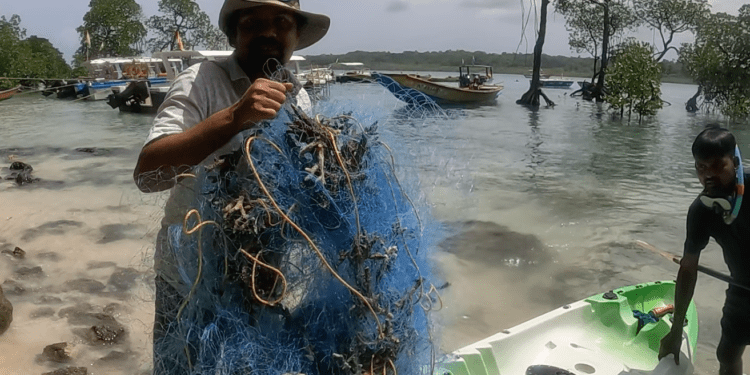Havelock Island | May 30, 2025
A significant marine conservation effort took place today off the coast of Havelock Island, where a team of scuba divers from Eco Diver India successfully removed a ghost net entangled in a dense coral reef. The operation, led by renowned marine ecologist Sajan Pulinchery, aimed to protect the fragile underwater ecosystem from further damage caused by discarded fishing gear.
The ghost net — a banned blue plastic fishing net — was reportedly left behind by local fishermen after it became heavily entangled with coral structures. Due to the substantial weight of live coral growth attached to the net, the fishermen abandoned it directly within the reef, posing a serious threat to marine biodiversity.
Responding swiftly, the Coral Rescue Team of Eco Diver India carefully extracted the net, preserving the live coral colonies that had attached to it. These corals were temporarily relocated to a specially maintained saltwater rehabilitation pool. After a period of recovery and careful monitoring, the corals were successfully replanted back into their native reef.
The restoration team, including Ashish Ikka, Abhishk T.S., Abhishek K.M., and Pradesh, worked under the guidance of Mr. Pulinchery to ensure the corals were handled and replanted with minimal stress.
Tourism operators, local officials, and environmental advocates were present to witness the net removal process and praised the team’s dedication to reef restoration.
Speaking on the occasion, Mr. Sajan Pulinchery noted, “The use of illegal fishing nets in Havelock Island has drastically declined in recent years due to enforcement by the Police and Fisheries Department. However, prolonged closures of tourist destinations like Elephant Beach — recently shut down due to crocodile sightings — have led to rising unemployment. Some individuals, out of desperation, have turned to illegal fishing practices, including the use of banned nets.”
Mr. Pulinchery called for sustained community support, alternative livelihood programs, and continuous monitoring of marine ecosystems to prevent further damage. He also appealed to authorities to provide immediate support to affected locals whose incomes have been impacted by the temporary closure of snorkeling and other water-based tourism activities.
This successful ghost net removal stands as a reminder of the delicate balance between human livelihoods and marine conservation, and the importance of community-based action to protect our oceans.



